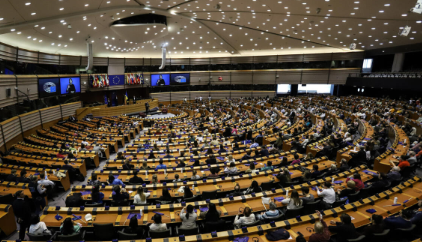
EU lawmakers will vote on Wednesday on a vast overhaul of the bloc’s asylum policies that would harden border procedures for irregular arrivals and require all member countries to pitch in.
The new Migration and Asylum Pact is a package of 10 laws drawn up after years of negotiations that aim to get European Union countries all with different national priorities to act together on the issue of migration, using the same rulebook.
If just one of the laws is rejected the whole package would fail though it is likely that would trigger last-minute haggling.
The European Parliament’s main political groups have indicated they will back the package. Parties on the far right and far left, though are against one or more of the laws.
Migrant charities and non-governmental organisations have also come out against the pact, seeing it as a bid to buttress “Fortress Europe” and make it much harder for refugees to seek protection.
“It’s a vote that is not a given,” acknowledged Fabienne Keller, a French lawmaker in the parliament’s centrist Renew group who shepherded one of the texts through.
The failure of one text could sink the entire package, she said, even though “a democratic majority in the European Parliament supports it”.
The package would establish border centres to hold irregular migrants while their asylum requests are vetted and speed up deportations of those deemed inadmissible.
In the name of European solidarity, it would also require EU countries to take in thousands of asylum-seekers from “frontline” states such as Italy and Greece if they find themselves under pressure from inflows.
Alternatively, the other EU countries could provide money or other resources to the under-pressure nations, or offset those contributions by helping with border security.
A particularly controversial measure is the sending of asylum-seekers to countries outside the EU that are deemed “safe” if the migrant has some ties to that country.
EU Home Affairs commissioner Ylva Johansson said Tuesday that she was “proud” of getting the package to a voting stage.
“I do hope that we will get it,” she said. “This has been a marathon.”
Long negotiations
The pact went through years of thorny talks and compromises.
The bloc saw the need to act in a united way when large numbers of irregular migrants arrived in 2015, many of them from war-torn Syria.
Initial ideas, such as sharing out “quotas” of migrants, butted up against refusals from several countries.
A rightward tilt in politics in much of the European Union in recent years, and increased geopolitical instability, have also complicated the search for consensus.
The European Commission drafted a revised proposal in 2020 which found political agreement in December last year.
Although many EU lawmakers from mainstream groups are alarmed about some of the harsher measures in the past, they back it as an overall improvement on the current situation, where responsibility is not shared.
Far-right lawmakers say parts of the package do not go far enough by, for example, blocking irregular migrants coming from “safe” neighbouring countries. However, they do approve of the pact’s expansion of biometric data gathering from arrivals.
Far-left lawmakers are outraged by what they see as an abandonment of European values of compassion and human dignity.
They are echoed by 161 rights organisations, among them Amnesty International, Human Rights Watch and the International Rescue Committee, which view the pact as “punitive” for migrants and asylum-seekers.
In parallel with the reform, the EU has been multiplying the sort of deal it struck with Turkey in 2016 to stem migratory flows. It has reached accords with Tunisia and, most recently, Egypt which are portrayed as broader cooperation arrangements.
If passed, the legislation is due to come into force in 2026. The European Commission is to set out over the next couple of months how the pact would be implemented.
Jean-Louis De Brouwer, a migration expert who used to be in charge of asylum and immigration policies at the Commission, expressed “serious doubts” about how the pact would end up working.
“We are heading towards a system that is objectively much more complex, and I’m not at all certain that member countries are inclined to pick up their game,” he said.
Another expert, Alberto-Horst Neidhardt of the European Policy Centre think tank, said he saw “a lot of grey areas” in the pact’s application.
But he said it also contained “an opportunity to change the way the EU views its immigration policy, moving from emotion-based discussions to fact-based ones”.
AFP

